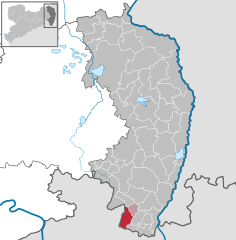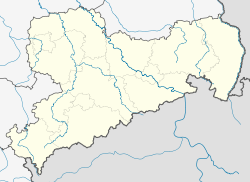Großschönau, Saxony
Großschönau | |
|---|---|
 Municipal office | |
Location of Großschönau within Görlitz district  | |
| Coordinates: 50°53′47″N 14°39′44″E / 50.89639°N 14.66222°E | |
| Country | Germany |
| State | Saxony |
| District | Görlitz |
| Municipal assoc. | Großschönau-Waltersdorf |
| Government | |
| • Mayor (2022–29) | Frank Peuker[1] |
| Area | |
• Total | 23.87 km2 (9.22 sq mi) |
| Elevation | 350 m (1,150 ft) |
| Population (2022-12-31)[2] | |
• Total | 5,276 |
| • Density | 220/km2 (570/sq mi) |
| Time zone | UTC+01:00 (CET) |
| • Summer (DST) | UTC+02:00 (CEST) |
| Postal codes | 02779 |
| Dialling codes | 035841 |
| Vehicle registration | GR, LÖB, NOL, NY, WSW, ZI |
| Website | www.grossschoenau.de |
Großschönau (Upper Sorbian: Wulki Šunow, pronounced [ˈwulkʲi ˈʃunɔf]; Czech: Velký Šenov) is a municipality in the district Görlitz, in Saxony, Germany located in the cross-border region with the Czech Republic. It used to be a famous Upper Lusatian center of Damask fabric production until the end of the 1980s. Since then it has turned into an area of tourism.
In Großschönau is the historical sylvan lido Trixi Park, a spa which was expanded with indoor swimming pools, a sauna, camping ground and holiday flats. The town is a child-friendly starting point for hikers and cyclists alike who want to explore both sides of the Czech-German border area with its relatively attractive price level. Mount Lausche (793 m) is situated in the community of Waltersdorf and marks the highest peak of the Lusatian Mountains.
Transport
A road connects German Großschönau with its Czech neighboring city of Varnsdorf. The railway station of Grossschönau offers tri-national connections to Poland, the Czech Republic and Germany as the existing track runs through all three countries of the Euroregion. As all countries are members of the Schengen Area, all border checkpoints have been eliminated.
Residents development
| Year | Population | |
|---|---|---|
| Neuschönau, Saxony[3] | Großschönau[4] | |
| 1871 | in 1867 to Grossschönau incorporated |
5715 |
| 1910 | – | 7806 |
| 1925 | – | 7348 |
| 1939 | – | 7093 |
| 1946 | – | 8299 |
| 1950 | – | 8471 |
| 1964 | – | 8088 |
| 1990 | – | 6371 |
| 2000 | – | 5707 |
| 2007 | – | 6310 |
| 2010 | – | 6035[5] |
| 2012 | – | 5804 |
| 2013 | – | 5767 |
| 2014 | – | 5714 |
| 2015 | – | 5589 |
Residents of note
- Johann Eleazar Zeissig, known as Schenau (1737–1806), German artist
References
- ^ Gewählte Bürgermeisterinnen und Bürgermeister im Freistaat Sachsen, Stand: 17. Juli 2022, Statistisches Landesamt des Freistaates Sachsen.
- ^ "Einwohnerzahlen nach Gemeinden als Excel-Arbeitsmappe" (XLS) (in German). Statistisches Landesamt des Freistaates Sachsen. 2024.
- ^ Neuschönau in the Digital Historic Index of Places in Saxony (Digitales Historisches Ortsverzeichnis von Sachsen)
- ^ Großschönau in the Digital Historic Index of Places in Saxony (Digitales Historisches Ortsverzeichnis von Sachsen)
- ^ 31. Dezember, Angaben der Gemeinde auf ihrer Website
Further reading
- Richter, Friedrich Theodor (1837). Geschichtlich-statistische Darstellung der Damastmanufactur-Orte Groß- und Neu-Schönau in der Königl.-Sächs. Oberlausitz (in German) (1 ed.). Leipzig, Germany: Julius Klinkhardt. ISBN 978-3-75361-315-4. Retrieved 2024-10-12. [1] (440 pages)
- Raetzer, Maren (2003) [2002]. Damast aus Großschönau - Die Produktionsstätte und die dort gewebten Kunstwerke vom 17. bis zum 19. Jahrhundert - Band I: Text & Band II:Katalog und Abbildungen (Dissertation thesis). Schriften zur Kulturwissenschaft (in German). Vol. 52. Hamburg, Germany: Verlag Dr. Kovač. ISBN 3-8300-0864-3. ISSN 1435-6589. (402+4 & 268+2+198+4 pages in 2 volumes)




